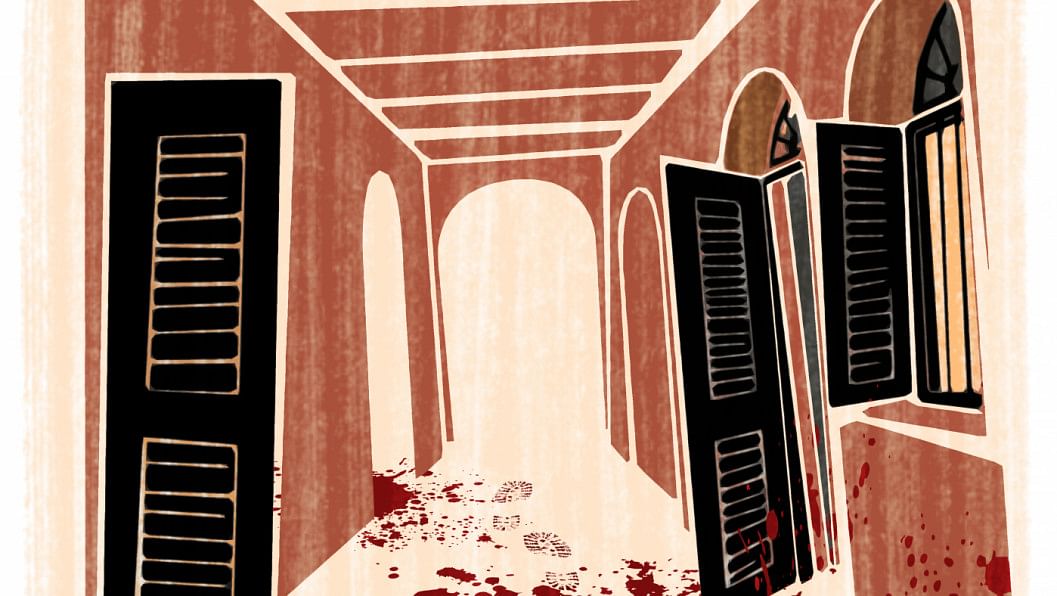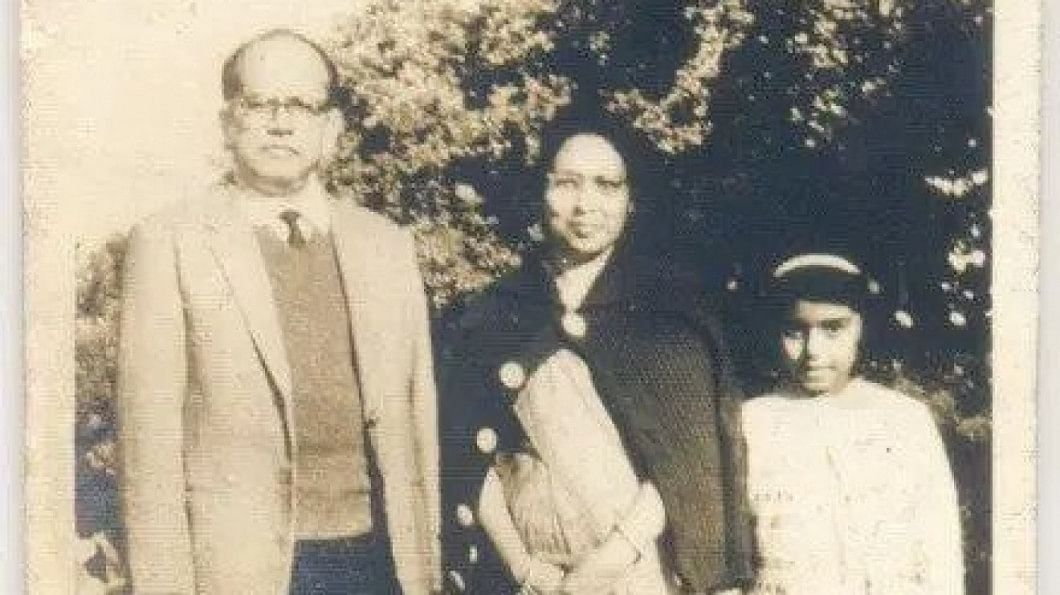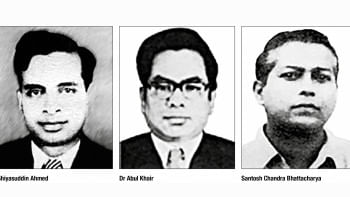My ’71: Experiencing Genocide, Understanding Violence

In the month of January 1971, I was a student of Class X of Holy Cross School. My parents and I were then living in the Dhaka University campus. My father, who taught English literature at the university, took up the administrative post of Provost of Jagannath Hall.
The political atmosphere gradually became heated. It was announced that on March 7, Sheikh Mujib would make his stand clear at a public rally in the Race Course Maidan. On March 2, a flag symbolising an independent Bangladesh was raised at Dhaka University! The reaction took the military leadership as well as all political elements in West Pakistan by surprise. All eyes and ears were fixated on Bangabandhu's speech.
The Ramna race course was very near to our house. Although we could not view Bangabandhu, we could hear his thundering voice blaring through the hundreds of mega-phones tied onto bamboo poles.
My father, who was a rationalist at heart and tended to decry emotionalism in form of "leader worship", seemed quite bowled over by Bangabandhu's speech. He said he wanted to write a poem about it. Incidentally once when he was in Class ten at the Mymensingh Zilla School, Netaji Subhas Chandra Bose had visited Mymensingh and he had written a poem about his visit.
The days that followed were like no other historical moment that the people of this region had experienced before. The largest civil disobedience movement since Gandhi's Swaraj was launched. People from all walks of life and profession showed allegiance to Bangabandhu's call. But no one had a clue as to what ultimately did take place, for like the civil disobedience phase, it too was a historic moment which had no precedence. It took place on the night of March 25, near to midnight.
I had gone to sleep and my father was examining some scripts. I was awakened by my father to the sound of gunfire. A convoy of jeeps came and stood outside the compound of our flat. Men, who by this time we noticed belonged to the Pakistan Army, their uniform being khaki coloured, rushed into the compound. They went to the door by the kitchen and demanded our domestic help Swarna Mashi to open it, pointing a gun at her. She had barely opened it when they practically threw her into the garden.
Three soldiers came forward towards us. It was obvious that they were not Bengali. One seemed like an officer. He asked in Urdu "Where is the professor?" My mother, who knew a little Urdu, asked, why? He replied, "We will take him." My mother replied, "Where will you take him?" They responded in a slow deliberate way, "Oh we will take him."
My mother hurried to my father, handed him a punjabi as he was in his vest and pajamas saying, "They have come to take you." The officer went up to my father asking, "Are you the professor?" My father replied in English, "Yes." He said, "We have come to take you (in Urdu)." My father queried in English, "Why?" The officer did not answer. Instead, he took him by his hand and led him out, telling us not to follow.
When the door opened, we saw that four soldiers in khaki had dragged down Muniruzzaman, who was Professor and Head of Statistics, a pious and devout man, along with his eldest son and two other members of his family. They were being dragged by their wrist while the women of their family and their younger son protested. My mother shouted out, "Don't resist, let them go. They may have come to arrest them. They also took my husband. If you resist they might shoot you!"
Seeing this, I ran to the phone to tell our friends what was happening, but on taking up the receiver, I saw the phone lines were dead. I rushed to my mother to tell her this, but no sooner had I reached her, we heard eight bloodcurdling shots reverberate the walls of the house. We held each other closely, then my mother and I ran to the front door as the sounds came and stared aghast at the scene that met our eyes. Nothing, nothing had prepared us for this.
Muniruzzaman and his three family members were lying in a pool of their own blood. Muniruzzaman himself seemed to be spot dead. Among the other three, some were groaning, one of the persons was even articulating "water" through his lips. The women in their family were running helter-skelter, trying to give them water. One of them shouted to my mother in tears, "Didi, you said they wouldn't shoot, but they did."
As we also tried to do our bit by providing some water to the victims, another lady from that family suddenly came to our door and called my mother urgently, "Didi, they have shot your husband as well! He is lying outside calling your names. I have given him some water."

Without a second's hesitancy, the three of us, my mother, Swarna Mashi and I, took off with whatever water we could carry through the kitchen door, across the garden at the back and into the front of the flat. We saw my father lying in front of our building. He was fully conscious but paralysed waist downward. Lying there, he told us what happened. He said, "The armed soldiers asked me my name. I told them my name. Then they asked my religion. I said Hindu. The minute I said that, there was an order to shoot. I fell down. One bullet had struck me on the waist and other had hit the nape of my neck. I had turned around slightly so it hit on the side."
He said he could not feel his legs anymore, it seemed he was paralysed waist downwards. Our immediate thoughts were of course to get him out of there and take him indoors. There were no telephones, no transport, impossible to go out on the streets with the army still patrolling. So the only answer could be to carry him indoors. We thought if we waited a while we would soon be able to take him across the road somehow to Dhaka Medical Hospital to be treated properly.
But alas, that was not to be. We spent the whole of that night and the whole of the next day and night before we could do anything. There was curfew all around and army jeeps were patrolling the streets. As the day wore by, my father grew weaker and weaker. He himself said that if we could not get him to a hospital soon, he would probably not survive. But his brain was still working. He asked us to listen to the radio in a low key to find out if we could know what was happening in the world outside, which would give us some kind of knowledge about what was going on.
We had a transistor with a relatively strong antenna, and it was through this box that we heard the declaration of independent Bangladesh. We had no clear idea whose voice it was at that time as the static was dreadfully loud. But its implications were apparent even to my father's draining spirit. When we told him what we heard, his response was to say to my mother, "Write!" My mother asked in a bewildered manner, "What, what should I write." He responded "History."
The night of the 26th was hard to cross, watching my father grow weaker with time. But in the morning the atmosphere had changed. We heard cars on the street. Then, a soft knocking was heard from our door. We opened it to find a host of men who had come from the street, staring aghast at the clots of blood still in our stairwell. When they knocked on the door they did not know what to expect. When they saw our faces, the first words that came out were "Ma!" Then, "What happened, how can we help you?"
They were a bunch of musullis who on the night of March 25 had been praying at Bakshi Bazaar Mosque, located in the corner of the crossroads where our flat was situated. When the army cracked down on Jagannath Hall and the surroundings, they could not move and was stuck there for the last two nights, hearing the gunfire and all the noise from our place. Looking at the blood on the floor, they thought that none was left alive in the building.
By that time, we were so desperate that our father should be taken to the hospital as soon as possible that when they offered to carry my father there, we agreed. They assured us that they had Iman (faith in Allah) and would not betray that in their undertaking. We wrapped up my father in a good bed cloth and together they lifted him onto a strong mattress and set off on their journey.
When we reached the emergency ward of the hospital, the scene that met our eyes was unbelievable. Patients with bullet wounds and other injuries were overflowing. Extra beds were put in the wards and even they could not meet the demand. Bandaged patients in mattresses lined the corridors. There was a distinctive stench in the air which later I came to recognise as the smell of blood.
When we went in, he was in a bed. He had been looked after and his wound dressed, and he seemed more spirited than before. He even said that since I am now in the hospital, there may even be a chance of surviving. But what the doctors had to say to my mother was not very hopeful. They said his injury was critical, especially the one that hit his phrenic nerve at the nape of the neck. The one that had paralysed him waist downwards was perhaps treatable in the sense of long term therapy. Admittedly, they did not know how his brain had survived for so long. They could only try to make him as comfortable as possible.
Once, when I was by his bedside, he told me not to be sad if he passed away. All that my young mind could think of was if only we could take him to a place where he could get better care, if only we could get an ambulance to do that. There was a dearth of Xray plates, ice and medication. I was praying for all that.
On the night of 27th or 28th , a resounding explosion took place that shook the walls of the hospital to the very core. The Pakistan Army was blowing up the Shaheed Minar by using explosives! In all the unthinkable events that had been occurring for the past few days, this added a new dimension. Killing people was one thing, but the depth of hatred that one possessed over another culture or civilisation was expressed through the killing of the symbols that characterised that culture or civilisation. It was for that reason that my mother, who on entering the hospital had felt safe (she had reassured me that in wartime the hospital was the safest place one could stay during a war), no longer felt safe any-more. Her first thoughts were for me.
Hence, the next day when my father's friend Abdul Gani Hazari, renowned poet and editor of the Pakistan Observer came with his wife and friends to see my father, my mother sent me home with them, making them promise that I will be back the next morning. My father had chided her for doing that, I heard later, but then each one had their own perceptions of security in this muddle riddled world.
I could not sleep at the Hazaris. They had given me sleeping pills, but what was raging through my half-awakened mind was images of ambulances, ice that was direly needed by patients, Xray plates and the thought of how to get it to my father. On March 30, as I climbed the stairs to the emergency ward, we all felt a change of atmosphere. Students and staff of Jagannath Hall were there. They tried to say something to Hazari Shaheb (as we called him) in sign language. He made me wait in the corridor as he went in first. Then I was beckoned. My father had breathed his last around 10.00am that morning.
My mother – sitting by his bedside, tearful as she was – took me in her arms and said, he was your friend. I burst out crying. My Maths teacher of Holy Cross School, Mr Gourango Prasad Mitra, a former student of Jagannath Hall, was there. He had gone to great lengths to find an Xray plate for my father and had found it. It was in his hands. He tugged at my arm and dragged me from the bedside into the arms of a young nurse, a total stranger, and told her to comfort me. She held me tight to her and uttered the words which changed my whole universe.
A young nurse who must have struggled hard to come to the city and take up a profession that sought to serve humanity, in one single utterance, taught me the history that was unfolding around me, the same history that my father must have realised as he heard the declaration of independence on the transistor radio. She said with sympathy, yet with conviction in her voice, "Don't cry. You are not alone in what you are facing. They (the Pakistan Army) are killing us all!"
And suddenly, I felt all my sense of personal loss dissipate and merge with all the personal losses of those around me; mothers, sisters, wives, fathers, husbands, brothers, friends losing the ones dear to their heart; all crying in unison, their lives enmeshed in each other by a single sense of loss that embraced not only the persons they loved but the totality of the lives they led, the faiths they believed in, the culture they practiced, the language they spoke, the land they loved.
Together, they constituted history; the history that my father told my mother to write, the history the Pakistanis wanted to destroy and obliterate by blowing the concrete foundations of the Shaheed Minar, the history of the struggle of millions of women and men who worked the soil, who studied hard in order to build their lives, feed their families and serve to express the love of free will against a regime that sought to destroy the very foundations of their existence. It was this realisation and knowledge of oneness that calmed me down and strengthened me to seek reason and meaning to my continued existence in a world fraught with tumultuous uncertainty.
A longer version of this article first appeared in the DUIR Webinar Series, a special publication of the Journal of International Relations, University of Dhaka, in March 2021, and has been reprinted with permission.
Dr Meghna Guhathakurta is the Executive Director of Research Initiatives, Bangladesh (RIB), and Professor (Retired) of the Department of International Relations, University of Dhaka.

 For all latest news, follow The Daily Star's Google News channel.
For all latest news, follow The Daily Star's Google News channel. 






Comments